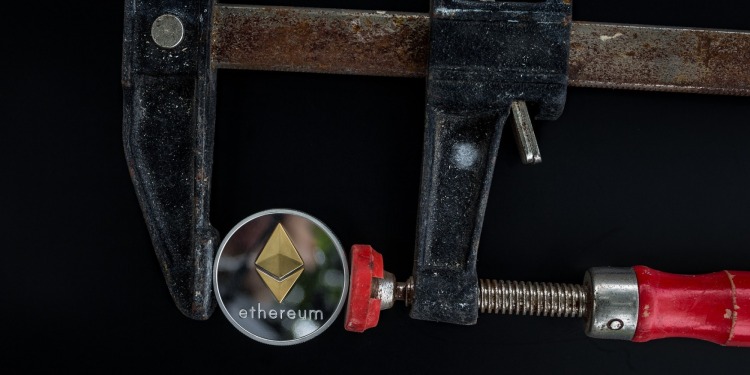The number of unique Ethereum addresses holding a positive amount of coins has reached an all-time high of 118.23K, according to cryptocurrency analytics platform Sentiment, which reveals growing investor participation. The apparent bullish signal could increase the demand for Ethereum and have a positive impact on prices. The current bull cycle seems to be motivated by a combination of technical drivers, including spot Bitcoin ETF inflows and an increase in the TVL in DeFi applications. The world’s second-largest cryptocurrency has rebounded from its 50-day moving average, with a current price of $3,626.68 and a circulating supply of 120.07M as seen on Binance.
Over the past couple of years, Ethereum has had countless non-zero addresses, which only goes to show the growing usage of Ethereum over Bitcoin among its users. The accounts that presently hold some tokens are separated from zero-asset addresses. Since the Merge, the Ethereum network’s energy consumption and carbon footprint have dropped by nearly 100%, and even if blockchain technology isn’t necessarily new, its adoption is sweeping across industries. Every Ethereum transaction, either a request to execute contract code or a transfer between two external accounts, is encoded in the same way. The zero-account is just a way to show that a new contract is being deployed.
What Are Non-Zero Balance Addresses, Anyway?
In the context of Ethereum, non-zero addresses are wallets or accounts on the blockchain that hold the tiniest amount of cryptocurrency. As opposed to traditional accounts with financial institutions, Ethereum gives users autonomy so they can decide how many tokens to buy. There’s no minimum amount of required deposits. The number of non-zero balance addresses is commonly used to measure Ethereum adoption, indicating whether people are investing and holding onto ETH. The Web3 developer community has turned out to be resilient, even if the industry is subject to rapid changes and market volatility, maintaining focus on the future of the ecosystem.
Ethereum’s Dencun Upgrade Went Live. It’s The First Step in Its Rollup-Centric Roadmap
The Dencun upgrade, which makes it possible for the network to function as a database for Layer-2 blockchains to store data more efficiently and affordably, went live on March 13, 2024, marking the beginning of the Surge era in Ethereum’s roadmap. It encompasses nine EIPs (Ethereum Improvement Proposals), including EIP-4844, commonly referred to as proto-danksharding. The Dencun hard fork represents the most critical upgrade since the Merge, and rollups and their users will leverage the benefits in the upcoming days, as the availability of data blobs leads to a 90% reduction in transaction costs on Layer-2 solutions.
The most recent changes to the Ethereum network support the transition from a more general-purpose blockchain to a database that spans across multiple Layer-2 networks, so Web3 users can transact without worrying about fees. Storing vast quantities of binary data in a database gives developers a chance to innovate without increasing the load on the network, so dApps and chains will identify new ways to use the temporary storage space. Ethereum’s scaling doesn’t forego decentralization – it’s not the path it wants to follow.
Indeed, Ethereum’s transition to the Proof of Stake consensus mechanism has encouraged centralization, but staking changes can prevent very large-scale operators from becoming dominant forces.
Related Articles: Accelerating the Race to Zero Carbon: Multiple Paths Leading to the Same Destination | Is $100 Billion in Climate Finance Enough to Offset Climate Damage? | What Is Green Finance and Why Does it Matter so Much? | Social Farming for Sustainable Development | Should Governments Support The Impact Economy?
Large Investors, Known as Whales, Show Confidence in Ethereum by Increasing Their Holdings
Increased whale transactions are a testament to the confidence vested in the Ethereum project. As highlighted by CoinGape, substantial transfers of Ethereum have seen a surge in recent weeks, triggering discussions about the potential implications for the digital asset’s long-term value.
Acquisitions were primarily made through decentralized exchanges, which don’t require personal information or have to go through a KYC process, therefore allowing for greater privacy and anonymity. Whales have between 1,000 and 10,000 coins. The nature of this accumulation is referred to as “buying the dip” and involves purchasing an asset following a decline in price.
Whales’ optimism has created a ripple effect in the broader cryptocurrency market. To be more precise, greed reflects the overall sentiment as the market is ripe for opportunity, with the success of spot Bitcoin ETFs driving optimism for approval for other ETFs. Still, according to Bloomberg analysts, there’s a 30% chance Ethereum ETFs will be approved this May.
It’s hard to explain or fully understand the SEC’s disapproval. Leaders in investment banking, such as JP Morgan and TD Cowen, are also pessimistic about spot Ethereum ETFs’ path to approval. The significant increase in whale transactions suggests a strong foundation for long-term growth and development in the ecosystem.
Ethereum Continues to Maintain Its Position Above The $3,550 Mark
Ethereum now changes hands at $3,626.68, with a 24-hour trading volume of $10.81B. By analyzing price history, you can understand the cryptocurrency’s potential and determine upcoming trends. Ethereum’s short-term range forecasts $4,000, which can be reached if the buying pressure is high. It could very well go above $10,000 in 2024, perhaps even higher, but it’s essential to be cautious of the investment craze. Before making any decisions, ask questions, do your homework, and calculate the risks. Above all, be wary of misinformation including fake news and online gossip, not to mention social media posts that create buzz.
Looking ahead, in spite of the rising popularity in Solana-based tokens, Ethereum’s price could turn bullish as network activity increases and traders’ positioning reflects their high expectations. The Ethereum blockchain has advanced as a top platform for developers, and the more popular NFTs and DeFi become, the more the long-term bull case makes sense. The non-zero balance milestone suggests new users have joined the ecosystem; they’re already playing an important part in the daily economic activity. The sudden and large move of new investors and their transactional activity make Ethereum likely to reach a new all-time high.
Conclusion
Ethereum’s achievement is particularly remarkable because it demonstrates a higher number of addresses, accentuating the broader reach and appeal of the blockchain. The Dencun upgrade allows for transaction activity to be moved off-chain, which offers lower costs to users. Sentiment towards Ethereum is optimistic as far as price corrections and the impact of leverage in the market are concerned.
Editor’s Note: The opinions expressed here by the authors are their own, not those of Impakter.com — Cover Photo Credit: WorldSpectrum.










